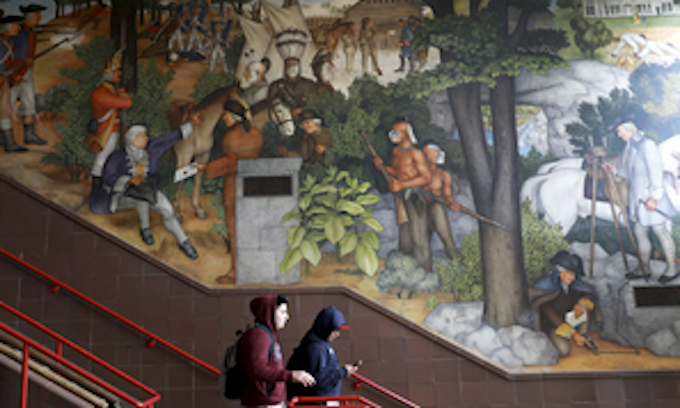(The Center Square) – As the city of San Francisco debates how to pay for a legacy of racism, its slavery disclosure ordinance asking businesses that contract with the city for voluntary donations to “ameliorate the effects of slavery” has not received a donation in seven years.
San Francisco’s Human Rights Commission released a memo in December 2022 that advocated the city give $5 million to each eligible Black resident. The U.S. Census estimated about 42,390 Black residents in the city in 2021. The commission didn’t say how many people would be eligible for the $5 million.
In 2006, San Francisco created a “slavery disclosure” ordinance under then-Mayor Gavin Newsom. The ordinance requires businesses that contract with the city to research its company’s history and report any financial transactions and activity that may have been part of the slave industry.
In 2015, two businesses acknowledged in their affidavits that they had ties to predecessor banks that benefitted from the slave trade.
Bank of America stated it couldn’t find an instance where any Bank of America legacy banks made a profit from slavery but did confirm “a direct connection to slavery by Southern predecessor banks.”
U.S. Bank National Association stated it acquired southern banks and identified records of founders or directors of predecessor banks who owned slaves. It also included a record showing the use of a slave as collateral for a loan.
That ordinance also encourages city contractors to make “contributions to a Special Fund to ameliorate the effects of slavery.” The most recent annual report in March 2022 states, “In February of 2015, letters requesting voluntary contributions were sent to all City vendors covered by the ordinance. No responses were received.”
A city official confirmed to The Center Square that only two companies had found ties to the slave trade and the fund had received no contributions.
The affidavit asks for records of each person subjected to slavery, each slaveholder and each person or entity who participated in the slave trade or derived profits from the slave trade.
The city started filing annual reports on the slavery disclosure ordinance in 2015 and sent a letter to all contractors covered by the ordinance for voluntary donations.
The city allows for exemptions.
The ordinance stated, “Insurance policies, loan documents and other documents and records provide evidence of ill-gotten profits from slavery, which profits, in part, capitalized insurers, financial services providers and textile companies. The successors of these companies remain in existence today, and such profits from the uncompensated labor of enslaved Africans represent a continuing legacy of slavery.”
Some of the businesses that filed an affidavit include Bank of America, U.S. Bank and EPIC Insurance Brokers & Consultants. Wells Fargo was exempt from filing an affidavit, but voluntarily submitted one. Wells Fargo is a vendor with the Controller’s Office of Public Finance.
The nonprofit Corporate Accountability profiled “the racist history of Wells Fargo” in June 2022. Wells Fargo bought Wachovia in 2008 “intertwining itself with a very dark history.” Corporate Accountability stated Wachovia descended from financial institutions “with deep ties to the mistreatment of black people.”
Antony Davies, an economist and associate professor of economics at Duquesne University, said there are likely very few companies in San Francisco today that also existed a century and a half ago.
“But, there are two entities that clearly did exist well before the abolition of slavery and clearly still exist today: the city and county of San Francisco,” Davies said. “Anyone in San Francisco who is concerned with identifying contemporaries who benefited from slavery should probably start with those two organizations.”
The city of San Francisco was founded in 1776. California became the 31st state in 1850.
The slavery ordinance states, “The City and County of San Francisco acknowledges the loss of assets that rightfully should be the property of descendants of African people subjected to slavery, and extends its apologies to their descendants who continue to suffer the legacy of slavery.”
The San Francisco Mayor’s office and a city employee involved with the slavery disclosure ordinance did not respond to emails seeking comment. Corporate Accountability didn’t respond to an email seeking comment. Wells Fargo didn’t respond to an email seeking comment.



















Hopefully, it won’t.
Just another Democratic party of demonic fund accumulations, proffered in fake good intentions, to be targeted by corrupted party city governing operatives, ,,in this case probably predominately black, for diversion of funds in more laundered money, skimmed to enrich San Francisco crime families like Pelosi’s and Kamala. It’s the same old formula,,,,cry about some fake social injustice as an excuse to gather honest money, destined to be diverted into democrat crime family funding even more cleverly than the Biden’s family Ukrainian scam. Since this one involves black Americans, and Biden has so far bought into black like a drug user on crack, you can bet his family as well is destined to get it’s 10 % of the scamming and skimming. Enter the modern age of American tax slavery, where the entire country and people of all colors are locked on the racial hate plantation with no place left for an exodus and the former UNITED states of American become the Democrat party racially divided states of insanity. If the life blood of 600,000 dead American civil war veterans is not enough to slake their thirst for dark money, nothing will,,,NOTHING WILL and the beat of this beating of American concepts of fair play will never end but in our own national self-destruction
You want donations for this BS go to Soros, Gates, Pelosis, Bezos.and Obama. See what they tell you.
” DOI:10.1080/00064246.2001.11431145Corpus ID: 219319032
David Horowitz’s “Ten Reasons Why Reparations for Slavery is a Bad Idea for Blacks—and Racist Too”
Published 1 June 2001
The Black Scholar”
WHAT legacy of slavery? CA Was built on the backs of irish and CHINESE LABOR.. Not on slaves.
The spanish enslaved thousands of American natives before the USA took over. Let Mexico pay the reparations.